Karekare
Karekare is spoken in Yobe State, Nigeria, in the area to the north and west of Potiskum, the largest city in Yobe State.
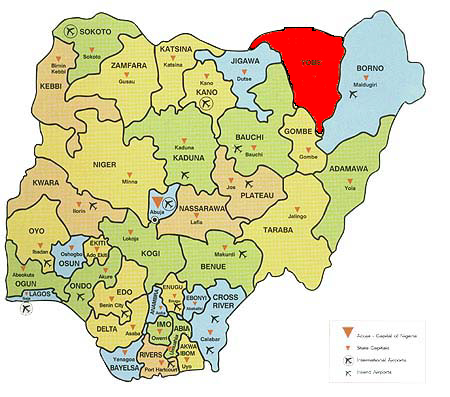
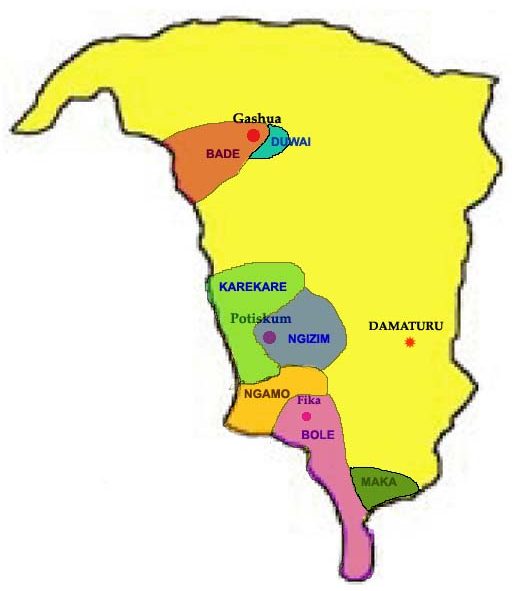
It is one of seven languages of the Chadic family indigenous to Yobe State, the others being Bade, Bole, Duwai, Maka, Ngamo, and Ngizim.
Karekare is a member of the West Branch of Chadic and is hence related to Hausa, the dominant language throughout northern Nigeria. Karekare’s closest linguistic relatives are, however, its neighbors, Ngamo and Bole.
The Ethnologue gives the number of Karekare speakers as 150,000-200,000, which seems a bit high, but something over 100,000 would be a reasonable figure. The pre-eminent traditional ruler of the Karekare people is Mai Tikau, HRH Muhammadu ibn Abubakar Shuwa, whose court is located in Nangere, about 20 kilometers north of Potiskum, though the traditional place of origin of the Karekare’s is Jalam, now in Bauchi State, west of Potiskum, and Jalam is still the site of the most important annual Karekare ritual, Bara ma Jalam ‘festival of Jalam’. Like all the traditional rulers of northern Nigeria, Mai Tikau is the prime Islamic figure for the Karekare people. Probably a majority of Karekares are Muslims, but Christians comprise a larger proportion of the Karekare population than of any of the other Yobe State ethnicities..
The Karekare people pronounce the name as “Karaikarai”. The origin of the name is uncertain. It resembles the Kanuri word kare ‘goods, things, load’, which has been borrowed into virtually every language in northeastern Nigeria, including all the languages of Yobe State. It has been suggested that the ethnic term Karekare is somehow related to this word. The table below shows the current autonyms for the people and language as well as the terms in Hausa and in Kanuri, which for many centuries was the dominant linguistic and cultural force in northeastern Nigeria. The terms for Karekare man and Karekare woman are clearly taken from Hausa–the Ba- prefix and feminine -iya suffix are specific to Hausa. Karekare, more than the other languages of Yobe State, readily absorbs elements from neighboring languages, including Hausa, which is now the unversal lingua franca for all of northern Nigeria, including Yobe State.
| KAREKARE | HAUSA | KANURI | |
| People | Bakarkarai (m), Bakarkariya (f) Karaikarai (pl) |
Bakarkare (m), Bakarkariya (f) Karaikarai (pl) |
Karekare |
| Language | bo Karaikarai ‘mouth/language [of] Karekare’ |
Karkaranci | Karekare |
Research on Karekare
Essentially all the material on this website derives from the Yobe Languages Research Project. This project has been supported by two awards from the US National Science Foundation. The first, “The Chadic Languages of Yobe State, Nigeria” (award #BCS-0111289, Russell G. Schuh, Principal Investigator), ran from 2001-2004. The second, “Lexicon, Linguistic Structure, and Verbal Arts in Chadic Languages of Northeastern Nigeria” (award #BCS-0553222, Russell G. Schuh, Principal Investigator), runs from 2006-2009. Directors of the project under both grants are Russell G. Schuh, the Principal Investigator, and Alhaji Maina Gimba, the In-Country Director. Several people participated in the Karekare team since the beginning of the project. The late Malam Kariya Gambo was with the project from 2001-2004. Others over that period were the late Dauda Mamu in 2002, Rifkatu I. Bumi in 2003, and Umaru Manu Karofi in 2004. Since 2007, the Karekare team has comprised Abubakar Idris Tikau and Ibrahim Yusuf. Thanks go also to HRH Alhaji Muhammadu ibn Abubakar Shuwa, Mai Tikau for his support and to Madu Liman and his family for indispensable logistic support.
- Abubakar Idris Tikau, 2009
- Abubakar, Gimba, Ibrahim, 2009
- L to R: Russell Schuh, Rifkatu I. Bumi, Malam Kariya Gambo, Alhaji Maina Gimba
- Gimba, Schuh, Abubakar, Ibrahim 2009
- Ibrahim Yusuf, 2009
- Abubakar, Schuh, Ibrahim, 2009
Karekare Greetings
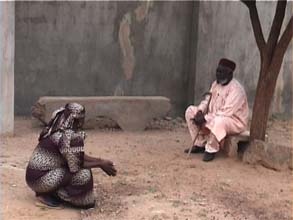
The movie below lets you hear some typical Karekare greeting exchanges.
Karekare Verbal Arts
The Yobe Languages Research Project has produced two collections of Karekare “verbal arts”, including folktales, proverbs, riddles, supersitions, and song texts. Click on the links below to see downloadable Karekare texts with translations.
 Ndar Ma Karatu [The Way To Read] (1955)
Ndar Ma Karatu [The Way To Read] (1955)
Ndar Ma Karatu is the earliest publication in Karekare. It was published in 1955 by the Northern Region Literacy Agency (NORLA) by the Gaskiya Corporation which, for many years, was the main publisher of books in Hausa. Karekare was one of a dozen or so northern Nigerian languages chosen at the time for creation of primers for adult literacy classes. Download the full text of Ndar Ma Karatu.
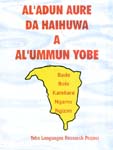 Traditional Marriage and Birth Customs (2002)
Traditional Marriage and Birth Customs (2002)
These are texts from Al’adun Aure da Haihuwa a Al’ummun Yobe [Hausa: Customs of Marriage and Birth among Yobe Peoples], a collection published in Potiskum in 2002 by The Yobe Languages Research Project. The collection comprises descriptions of marriage and birth practices among five Yobe groups: Bade, Bole, Karekare, Ngamo, and Ngizim. Click on the links below for the Karekare texts with line by line English translation.
D’akwar Ta Karaikarai [Marriage of the Karekares]
Zina Sim Ma Karaikarai [Birth and Naming of the Karekares]
 Dindeno ka gi ma Malam Kariya Gambo [Tales from Malam Kariya Gambo] (2003)
Dindeno ka gi ma Malam Kariya Gambo [Tales from Malam Kariya Gambo] (2003)
Dindeno ka gi ma Malam Kariya Gambo [Tales from Malam Kariya Gambo] is a collection of ten traditional tales written by Malam Kariya Gambo of Potiskum. This collection was published in 2003 by Ajami Press, Potiskum with the support of the Yobe Languages Research Project. The tales can be downloaded in pdf format by clicking on the links below. The files are formatted line by line with Karekare and rough English translations. The translations attempt to convey the sense of the Karekare text in understandable English, while being as literal as possible to mirror the structure of the Karekare original.
“Kwam ma Jide Seka Ndeb’in” [“The Thirsty Cow Drinks Dirty Water”]: The tale of a wilful girl who won’t take advice about choosing a husband and the troubles she has as a result.
“Ba Jire Kaleka Cawa Bai” [“One Who is Right Will Not Suffer Shame”]: A tale of how the arrogance of a favored wife ends up bringing her shame.
“Lewi Ba Kabu Walai A Jaga Ta dungurum” [“The Boy with and Abbreviated Life in Dungurum Town”]: The story of the son of a king who cannot escape his predestined fate.
“Bukar Ka Abari” [“Bukar and Abari”]: A tale of two giants and the source of earthquakes and thunderstorms.
“Bido Ka Dila” [“The Monkey and the Jackal”]: A tale of how the monkey the jackal settled their argument about whether or not being cut with a knife was more painful than being lied to.
“Ada Ka Gam” [“The Dog and the Ram”]: A tale describing the adventures of a dog and a ram after they decided to leave home and make their own life.
“Nzafai Ma Gwadagori Ka Rayan” [“Friendship of the Tortoise and the Birds”]: A tale of how the tortoise was carried to a festival of the birds in the sky and why the tortoise’s shell is rough.
“Sawana Ka Kezi” [“Spider and the Chicken”]: The story of how Spider, the trickster, married a hen, then deteriorated into laziness.
“Buzuru Ka Mende Hnni Bad’u” [“The Billygoat and his Five Wives”]: The story of how a billygoat, was shamed because of his dissolute behavior.
“Ngozo Ka B’elawi” [“The Lizard and the Dove”]: A story of how a lizard became attracted to a dove and why lizards have no external penis.
 Asim Ma Bo Karai-karai [Wisdom in the Karekare Language] (2004)
Asim Ma Bo Karai-karai [Wisdom in the Karekare Language] (2004)
Asim Ma Bo Karai-karai [Wisdom in the Karekare Language] is a collection of proverbs, riddles, and song texts, published by the Yobe Languages Research Project in 2004 (printed by Ajami Press, Potiskum). Click on the links below to download the Karekare texts with English translations.
Tad’a Ida ta Caca [“Breaking the Eye of Speaking”–Proverbs]
Dindeno Ta Bara Jago [Sayings for Giving Away the Town]
 Dindeno Ka Asum Ma Bo Karekare [Tales and Wisdom in Karekare] (2007)
Dindeno Ka Asum Ma Bo Karekare [Tales and Wisdom in Karekare] (2007)
Dindeno Ka Asum Ma Bo Karekare is a collection of four folktales, narrated and transcribed, 32 proverbs, and 20 superstitions/beliefs. Collection of al these materials and transcription of the recordings was done by Abubakar Idris Tikau and Ibrahim Yusuf. This collection was published by the Yobe Languages Research Project in the summer of 2007 (printed in Potiskum by Ajami Press).
Tales:
- Zanjai Ka Ada [A Hyena and a Dog], told by Aisha Ibrahim Garin Daura
- Nga Ka Baye [A Man and His Daughter], told by Sule Bala Garin Jata
- Buri Ma Wakai [A Herd of Goats], told by Sule Bala Garin Jata
- Mendo Ka Batau [A Woman and Her Daughter], told by Sule Bala Garin Jata
-
Proverbs:
Proverbs, collected by Abubakar Idris Tikau and Ibrahim Yusuf
Superstitions/Beliefs:
Superstitions/Beliefs, collected by Abubakar Idris Tikau and Ibrahim Yusuf
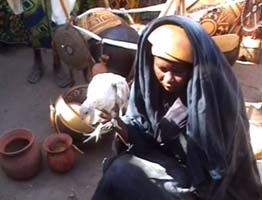 DINDENO, ASUM KA WAD’O MA BO KARAI-KARAI (2009)
DINDENO, ASUM KA WAD’O MA BO KARAI-KARAI (2009)
Audio recordings of the following materials will be available shortly:
Tales
Men Bad’u [Five Things], Ago Yahai Gasko: Five animals are living with their children, but trouble erupts when the donkey’s child kills the lion’s child.
Zanjai ka Auyaku [The Hyena and the Squirrel], Ago Yahai Gasko: As usual, the clever squirrel repeatedly and mercilessly tricks the greedy hyena.
Zanjai ka Ada [The Dog and the Hyena], Ago Yahai Gasko: The dog tricks the hyena into eating her own children, and the hyena seeks revenge.
Songs
Badine na Lato [The Girl is Leaving]: Song sung as a bride moves to her new house.
Wande Waye-Waye [The Good Times are Over]: Song sung to a new bride
Yawai Danganu [Oh Misery, Resign Yourself]: A bride laments her loss of freedom.
Abu Arufe [name of a type of sorghum]: An obscure song (at least for an outsider) about the prowess of men.
Gariyo ma Wuna Jaga ta Tikau [Gariyo on Obtaining the Town of Tikau]: A song of joy on the establishment of the Emirate of Tikau, with a Karekare Emir.
Gariyo ma Asa Ka ta Idim ma Degubi [Gariyo in Praise of the Idifu of Degubi]: Praise of the current head of Degubi town.
Kara Baiye? [How is it ?? ?]: A call-and-response girls song of innuendo and sorcery.
Ka Wura Beno [You Will Descend, My Son]: Lament on the death of a son.
Na La Bodiga [I Am Going to the Tarmac]: Song on the opening of Potiskum airport.
Kwaikwado Na Gad’e [The Bead Belt is Passing]: A song about boys being attracted to girls.
 Unpublished prose documents in Karekare
Unpublished prose documents in Karekare
Karekare Papers
Further you find links to descriptive papers specifically on Karekare. For more general papers, some of which include Karekare data, see Papers on the Yobe Languages.
Schuh, Russell G., 2003. “Shooting Through the Nose in Karekare”
(revised September 2005) Karekare has a set of nasally released stops, that is stops that are formed by a closure somewhere in the mouth, with the release of the stop through the nose rather than through the mouth. American English has a nasally released d in words such as ridden, where one places the tongue to form d, but then moves directly to the n with no intervening vowel, in effect pronouncing [ridn]. Karekare does this not only with d, but also with t, d’ (“implosive d“), and even n inself and nd. Moreover, unlike English, where nasally released d is possible only in the middle of a word, Karekare has nasally released stops both in the middle of a word and at the beginning of a word, for example the t in /tina/ ‘food’ is pronounced something like [hnna]
You can see a demonstration of nasally released stops by two speakers of Karekare by clicking here
This paper argues, among other things, that the fact that Karekare has nasally released stops is related to the fact that Karekare has neutralized the distinction between medial short i and u. To see a demonstration of this neutralization in comparison with closely related languages that retain it, click here.
Schuh, Russell G. “The Karekare Verbal System”: This paper provides s summary of the morphological parameters that determine the make-up of Karekare verb forms.
Schuh, Russell G. “Karekare Verb Paradigms” (posted July 7, 2010): Complete tables illustrating all combinations of verb classes, TAMs, marking for subject plurality, extensions, and pronominal affixes.
Karekare dictionaries
Karekare-English-Hausa Dictionary (2nd edition, 2009) (2.3 MB)
English-Karekare Wordlist (588 K)
Hausa-Karekare Wordlist (584 K)
A collection of dictionaries of Yobe languages can be found here.







